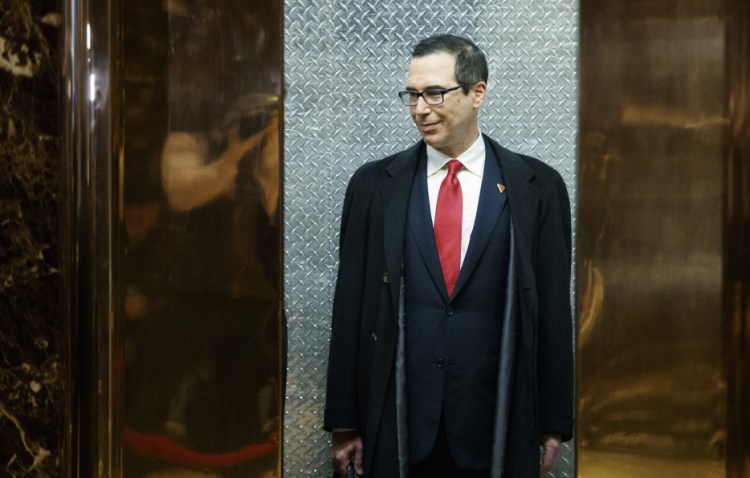President-elect Donald Trump’s nascent administration on Wednesday began outlining the contours of its strategy for jump-starting the nation’s economy, including how it would overhaul the tax code, rethink trade agreements and directly negotiate with major corporations.
Treasury secretary nominee Steven Mnuchin rejected claims that Trump’s tax program would benefit mainly the wealthy, instead highlighting plans for a child-care tax credit and a middle-class tax cut.
“There will be no absolute tax cut for the upper class,” he said on CNBC. “There will be a big tax cut for the middle class.”
Trump’s strategy secured an early victory this week when the president-elect persuaded air-conditioning manufacturer Carrier not to move as many as 1,000 jobs from Indiana to Mexico. The negotiation was an unusual move for a modern president, but Mnuchin suggested such direct intervention would be an important tool under the new administration.
“It starts with an attitude of this administration,” Mnuchin said Wednesday on CNBC. “This president … is going to have open communications with business leaders.”
Mnuchin and Trump’s pick for commerce secretary, Wilbur Ross, also called for moving away from the broad multinational free trade agreements that have shaped the global economy over the past generation in favor of bilateral deals. But they stopped short of embracing Trump’s most heated election rhetoric: calling for double-digit tariffs on imports from China and Mexico.
Turning Trump’s sweeping campaign promises into reality could prove a daunting challenge for his newly named economics team. Trump’s proposals are aggressive, starting with a pledge to create 25 million jobs and push growth to 4 percent annually.
Many economists have questioned whether that is even possible in the face of an aging workforce and slower growth in productivity. In addition, rewriting the tax code would be a mammoth undertaking that has eluded Republican lawmakers since the 1980s, and independent analysts cast doubt on whether Trump can make the numbers add up.
On Wednesday, Trump’s new economic team said that overhauling taxes – particularly cutting the corporate tax rate – would create incentives for businesses to invest and hire more workers, eventually resulting in higher tax revenue. But an analysis by the independent Tax Foundation estimated that Trump’s plan would cost at least $2.6 trillion over the next decade, even after accounting for stronger growth.
Mnuchin and Ross reiterated the administration’s commitment to cutting taxes for the middle class, but that remains a key difference between the campaign’s plan and the tax blueprint put forth by Republican leaders on Capitol Hill.
The congressional plan, like Trump’s, would cut taxes for the wealthy and for corporations, but it would not do nearly as much as Trump would to cut taxes for lower- and middle-income Americans.
Reconciling the two will be a major sticking point in any tax-reform negotiations next year, although House Speaker Paul Ryan, R-Wis., praised Trump’s nominees Wednesday.
“I am excited to get to work with this strong team to fix our broken tax code, ease the regulatory burden on American businesses, and grow our economy,” he said.
Mnuchin also pushed back against analysis by the nonpartisan Tax Policy Center that found the bulk of the benefits under Trump’s plan would go to wealthy households, while some single-parent households would pay higher taxes.
Business groups welcomed the focus on tax cuts and praised Trump’s nomination of Cabinet officials with industry backgrounds.
“They understand that modernizing our outdated, anticompetitive tax system will be the most effective way to produce the economic growth that puts more people to work in good jobs,” said John Engler, president of the Business Roundtable.
On trade, Mnuchin and Ross sounded a somewhat softer note than Trump did on the campaign trail. During the election, Trump called China the world’s “single greatest currency manipulator.” But on Wednesday, his top economic advisers demurred when asked whether they would take formal action against the country.
“If we determine that we need to label them as a currency manipulator, that’s something the Treasury would do,” Mnuchin said.
They expressed disapproval of sweeping multinational trade agreements, but backed away from threats to impose double-digit tariffs on imports from Mexico and China.
“Everybody talks about tariffs as the first things. Tariffs are the last thing. Tariffs are a part of the negotiation,” Ross said on CNBC. “The real trick is going to be increase American exports.”
Trump’s efforts to keep Carrier in Indiana underscore both the potential benefits and pitfalls of his hands-on approach. Under the agreement, the company will receive tax incentives from the state economic development corporation to keep about 1,000 jobs in the state, said John Mutz, a member of the agency’s board.
If the agreement is only for a few years, Trump’s efforts might give workers only a temporary reprieve.
Experts said such custom deals such as the one struck with Carrier could create a haphazard system in which the government winds up picking corporate winners and losers, said Timothy Bartik, an economist at the nonpartisan W.E. Upjohn Institute for Employment Research.
“If you think of things as deals, who gets the deals?” Bartik said.
Send questions/comments to the editors.



Success. Please wait for the page to reload. If the page does not reload within 5 seconds, please refresh the page.
Enter your email and password to access comments.
Hi, to comment on stories you must . This profile is in addition to your subscription and website login.
Already have a commenting profile? .
Invalid username/password.
Please check your email to confirm and complete your registration.
Only subscribers are eligible to post comments. Please subscribe or login first for digital access. Here’s why.
Use the form below to reset your password. When you've submitted your account email, we will send an email with a reset code.